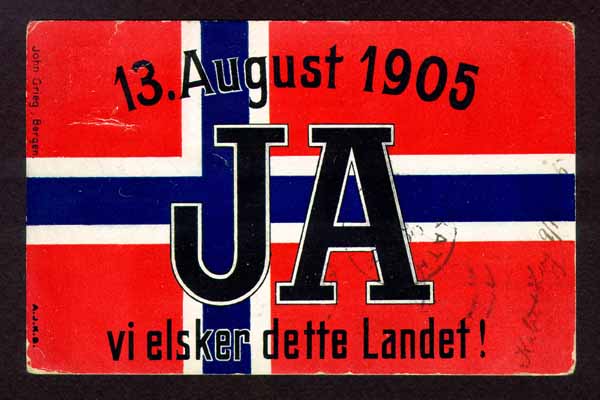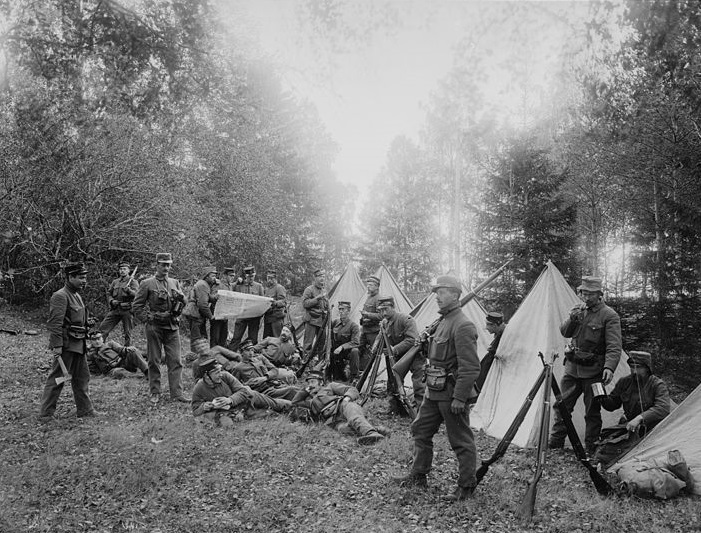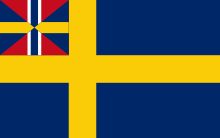They didn't sail around Africa as they used the Suez Canal as a shortcut. So no exotic animals on board.What about the snake that almost hijacked a ship?
You are using an out of date browser. It may not display this or other websites correctly.
You should upgrade or use an alternative browser.
You should upgrade or use an alternative browser.
The German Century
- Thread starter Joriz Castillo
- Start date
- Status
- Not open for further replies.
they used the Suez Canal as a shortcut
Interesting What had France in mind to let the Russian true the Suez Canal ?
or they have ask for little favor from Russia in future ???
Britain controls the Suez Canal (and Egypt) at this point, so France isn't involved.Interesting What had France in mind to let the Russian true the Suez Canal ?
or they have ask for little favor from Russia in future ???
Ja, Vi Elsker Dette (Jævla) Landet
This part will be divided into three parts since it's quite long.
Scandinavia had often been known as the peaceful region of Europe where no war had been fought on its soil since 1814. The nations weren't great powers in any way and had no colonies as well. Thus explains the surprise everyone felt when a conflict broke out over the fate of the Union between Sweden and Norway. To understand what happened that led to the events in Scandinavia, one must look back to the root causes that go back almost a century from then.
When Norway declared independence from Denmark in 1814, Europe was in the final days of the Napoleonic Wars. A Regency Council which consisted of nobles and commoners alike elected a king from the Danish royal house, Christian Frederik. To survive, they made diplomatic missions to the major nations of Europe.
But Sweden, having recently lost Finland to Russia, demanded and was given compensation in the form of the land west of the country, Norway. The new king, Charles XIII Bernadotte, made it his mission to subdue Norway and bring it into Sweden's fold. Unsurprisingly, the Norwegians didn't like this and took up arms to defend their independence. The Swedish army marched west but lost a few battles at places like Lier, Langnes and Matrand but started winning at places like Hvaler, Fredrikstad, and Kjolberg Bridge. Seeing the inevitability of a Swedish victory that was assisted by a British blockade, the Norwegians requested a cease-fire. Norway had capitulated while not being conquered and was given a very light treatment.
Instead of being integrated as mere Swedish provinces, the country was allowed to retain its constitution, laws, legislature, judiciary, administration, army, and currency. However, both nations had a common monarch and foreign policy was to be conducted through the Swedish ministry of foreign affairs. The two nations were joined in a personal union, creating what is called the United Kingdoms of Sweden and Norway or Sweden-Norway for short. Throughout the century, disputes regarding the powers of the Swedish King and the Norwegian parliament sprung up from time to time.
Public opinion was divided at best, with Norwegians having a mixed view of the Union in contrast to the positive views of the Swedes. Whilst Norway had considered itself pacifist and more democratic, Sweden had a militaristic and conservative nature. This was the reason why Alfred Nobel decided to host the Nobel Peace Prize in Christiania rather than Stockholm.
In the late 19th century, both countries had several disagreements regarding each government's policy. The issues ranged from demands for separate consuls and foreign services to trade policies. While the two countries were part of one union, they were worlds apart according to their interests. As a result, cracks began to form. In 1905, as talks between the two governments regarding the foreign ministry dragged on due to disagreements, the King broke off negotiations that he initiated but still hoped for a settlement.
While Crown Prince Gustaf appealed to both cabinets to return to the negotiating table, the Norwegians finally had enough. They realized that a fair solution to the conflict was impossible and there was only one way: The Union had to be dissolved.
On May 23, the Storting passed the government's proposal for the establishment of separate Norwegian consuls. Immediately, the king vetoed the bill but, in anticipation of such a move, the Norwegian ministry tendered their resignations. In a tit for tat move, the king refused to accept their resignations but the ministers disobeyed his order and left for Christiania.
On June 7, the Storting voted to dissolve the Union. Reactions were strong in Stockholm as the King called a session of the Riksdag to consider what measures should be taken for Norway's "revolt". The conservative Riksdag declared it would not negotiate the dissolution of the Union, even if the Norwegians possibly hold a referendum. It also voted 100 million kronor to be set in case of war.
In shock with such a declaration, the Norwegians borrowed 40 million kroner from France and gauged the readiness of its troops. Meanwhile, they also announced a referendum on dissolution which would be held on August 13 but the Swedish supreme court declared it illegal. The plebiscite went ahead anyway with 100% of the population voting yes and Norway (unofficially) declared its independence.
As the situation got tenser, the Swedish and Norwegian armies were mobilized towards their respective border and a standoff ensued. Both sides had support from foreign nations as well. While the Norwegians were supported by the British and (unofficially) the Danes, Sweden had the support of Germany which promised to back their side in case of foreign intervention by the other side. Feeling confident with this support, the Swedes sent an ultimatum to the Storting demanding they revoke their declaration of independence before September or they will march towards Christiania and dissolve the government. When August came and went without a reply from the Storting, the bugle was sounded the armies started marching. It was time for war.

The Norwegian Storting passes the bill dissolving the Union

Postcard from the Norwegian referendum. The phrase would become the opening words of the Norwegian national anthem.

Norwegian troops at the border, August 1905
The Second Swedish-Norwegian War
aka
The Norwegian War of Independence
Part 1: Ja, Vi Elsker Dette (Jævla) Landet



aka
The Norwegian War of Independence
Part 1: Ja, Vi Elsker Dette (Jævla) Landet



Scandinavia had often been known as the peaceful region of Europe where no war had been fought on its soil since 1814. The nations weren't great powers in any way and had no colonies as well. Thus explains the surprise everyone felt when a conflict broke out over the fate of the Union between Sweden and Norway. To understand what happened that led to the events in Scandinavia, one must look back to the root causes that go back almost a century from then.
***
When Norway declared independence from Denmark in 1814, Europe was in the final days of the Napoleonic Wars. A Regency Council which consisted of nobles and commoners alike elected a king from the Danish royal house, Christian Frederik. To survive, they made diplomatic missions to the major nations of Europe.
But Sweden, having recently lost Finland to Russia, demanded and was given compensation in the form of the land west of the country, Norway. The new king, Charles XIII Bernadotte, made it his mission to subdue Norway and bring it into Sweden's fold. Unsurprisingly, the Norwegians didn't like this and took up arms to defend their independence. The Swedish army marched west but lost a few battles at places like Lier, Langnes and Matrand but started winning at places like Hvaler, Fredrikstad, and Kjolberg Bridge. Seeing the inevitability of a Swedish victory that was assisted by a British blockade, the Norwegians requested a cease-fire. Norway had capitulated while not being conquered and was given a very light treatment.
Instead of being integrated as mere Swedish provinces, the country was allowed to retain its constitution, laws, legislature, judiciary, administration, army, and currency. However, both nations had a common monarch and foreign policy was to be conducted through the Swedish ministry of foreign affairs. The two nations were joined in a personal union, creating what is called the United Kingdoms of Sweden and Norway or Sweden-Norway for short. Throughout the century, disputes regarding the powers of the Swedish King and the Norwegian parliament sprung up from time to time.
Public opinion was divided at best, with Norwegians having a mixed view of the Union in contrast to the positive views of the Swedes. Whilst Norway had considered itself pacifist and more democratic, Sweden had a militaristic and conservative nature. This was the reason why Alfred Nobel decided to host the Nobel Peace Prize in Christiania rather than Stockholm.
In the late 19th century, both countries had several disagreements regarding each government's policy. The issues ranged from demands for separate consuls and foreign services to trade policies. While the two countries were part of one union, they were worlds apart according to their interests. As a result, cracks began to form. In 1905, as talks between the two governments regarding the foreign ministry dragged on due to disagreements, the King broke off negotiations that he initiated but still hoped for a settlement.
While Crown Prince Gustaf appealed to both cabinets to return to the negotiating table, the Norwegians finally had enough. They realized that a fair solution to the conflict was impossible and there was only one way: The Union had to be dissolved.
On May 23, the Storting passed the government's proposal for the establishment of separate Norwegian consuls. Immediately, the king vetoed the bill but, in anticipation of such a move, the Norwegian ministry tendered their resignations. In a tit for tat move, the king refused to accept their resignations but the ministers disobeyed his order and left for Christiania.
On June 7, the Storting voted to dissolve the Union. Reactions were strong in Stockholm as the King called a session of the Riksdag to consider what measures should be taken for Norway's "revolt". The conservative Riksdag declared it would not negotiate the dissolution of the Union, even if the Norwegians possibly hold a referendum. It also voted 100 million kronor to be set in case of war.
In shock with such a declaration, the Norwegians borrowed 40 million kroner from France and gauged the readiness of its troops. Meanwhile, they also announced a referendum on dissolution which would be held on August 13 but the Swedish supreme court declared it illegal. The plebiscite went ahead anyway with 100% of the population voting yes and Norway (unofficially) declared its independence.
As the situation got tenser, the Swedish and Norwegian armies were mobilized towards their respective border and a standoff ensued. Both sides had support from foreign nations as well. While the Norwegians were supported by the British and (unofficially) the Danes, Sweden had the support of Germany which promised to back their side in case of foreign intervention by the other side. Feeling confident with this support, the Swedes sent an ultimatum to the Storting demanding they revoke their declaration of independence before September or they will march towards Christiania and dissolve the government. When August came and went without a reply from the Storting, the bugle was sounded the armies started marching. It was time for war.

The Norwegian Storting passes the bill dissolving the Union

Postcard from the Norwegian referendum. The phrase would become the opening words of the Norwegian national anthem.

Norwegian troops at the border, August 1905
Last edited:
If anyone knows battle tactics and strategy on how this war would play out, PM me.
Pretty much the only way to get 100% of people voting for something is by rigging the election; I don't care how pissed off Norwegians on average were at the union, there would be some who would vote to stay because they actually like Sweden, because they're hard-core monarchists and won't vote against the King, because they hate their neighbors and will vote the opposite of whatever the neighbors are voting, because they're afraid of war, because they misunderstand the ballot, or whatever. So unless it was your intention to suggest the voting was rigged, you should probably lower that; low 90s is just barely imaginable in this scenario, but honestly I'd expect 70s or 80s.
According to Wikipedia, 99.95% of Norwegians voted yes for the dissolution while only 184 people voted no. 99.95% is described as 'almost 100%' in the pagePretty much the only way to get 100% of people voting for something is by rigging the election; I don't care how pissed off Norwegians on average were at the union, there would be some who would vote to stay because they actually like Sweden, because they're hard-core monarchists and won't vote against the King, because they hate their neighbors and will vote the opposite of whatever the neighbors are voting, because they're afraid of war, because they misunderstand the ballot, or whatever. So unless it was your intention to suggest the voting was rigged, you should probably lower that; low 90s is just barely imaginable in this scenario, but honestly I'd expect 70s or 80s.
Wow. The wording of the referendum could be a factor, though the wording on wikipedia doesn't seem like it should have made that much difference (though it could be badly translated, I suppose). But even if that contributed, I can't help but suspect OTL vote was rigged; the lizardman constant should make results much over 95% pretty much impossible.
I wonder how was that possible as well...I can’t believe that’s actually otl. What pushed the entire population to vote no?
Implausible but yet it happened.In OTL 99.x % of Norweigians voted for independence so this is not so impossible rate. Implauisible surely but not ASB altough I don't know why it was so high.
But for what reason? Was the Swedish so overbearing that the entire Norwegian people wanted independence? Genocides, taxes, language disputes, what was the reason there was a 99 percent majority? (I checked Wikipedia, not much info)Implausible but yet it happened.
Maybe for the reason that they wanted the Union to be looser and looser. When it was blocked, they said "fuck it" and decided to leave.But for what reason? Was the Swedish so overbearing that the entire Norwegian people wanted independence? Genocides, taxes, language disputes, what was the reason there was a 99 percent majority? (I checked Wikipedia, not much info)
Correct me if I'm wrong on this one.
*BUMP*
Can anybody help me regarding the tactics and strategy of Swedish Norwegian war here? Without it, I'm blind as a bat.
Can anybody help me regarding the tactics and strategy of Swedish Norwegian war here? Without it, I'm blind as a bat.
Not sure if Swedes had exact plan but probably they try take Oslo with direct assault. Mountanous terrain might cause for them some problems. Remember that Sweden-Norway hasn't expericed war since days of Napoleon so both armies has not any experience and might be mildly behind of other European armies regarding tactics and military equipments.
And Sweden probably wants end war quickly when winter is coming and things are not nice then.
And Sweden probably wants end war quickly when winter is coming and things are not nice then.
- Status
- Not open for further replies.
Share: